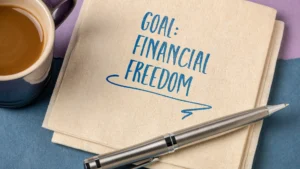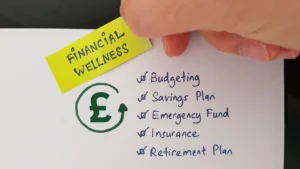Managing personal finances is a vital skill that plays a significant role in determining financial success. While some people seem to have an innate talent for managing their money, anyone can develop good money habits. By cultivating the right mindset and consistently practising sound financial decisions, you can ensure that your finances remain secure, healthy, and prepared for growth. This blog will explore how to develop good money habits, identify bad habits that can lead to financial loss, and provide actionable steps to improve your financial situation.
What Are Good Money Habits?
Good money habits are the consistent actions and decisions that contribute to better financial outcomes. These habits include budgeting, saving, investing, and managing debt. The core of good money habits is their ability to lay the foundation for long-term wealth building, debt avoidance, and financial stability.
Some examples of good money habits are tracking expenses, paying off debt promptly, and prioritising savings. When practised consistently, these actions help ensure that your financial health remains strong, and that you’re on track to achieve your long-term goals.
Why Are Good Money Habits Important?
Good money habits are essential for a variety of reasons:
- Build Savings: Having a savings plan helps you prepare for emergencies, retirement, and other long-term financial goals.
- Avoid Unnecessary Debt: Good money habits allow you to avoid the burden of credit card debt and high-interest loans.
- Increase Financial Literacy: Developing financial knowledge empowers you to make informed decisions about your money.
- Achieve Financial Independence: By sticking to good habits, you can live within your means and reduce reliance on loans and credit cards.
- Peace of Mind: Consistently practising good habits provides financial security and peace of mind, knowing you are on the right path.
By adopting good money habits, you can secure your financial future and avoid many of the pitfalls that cause financial distress.
Learn more on how to save more and spend wisely in our Personal Money Management Tips to Save More and Spend Wisely article.

10 Good Money Habits to Start Practising Today
Here are 10 practical money habits to help improve your finances:
1.Start Budgeting Early
Creating and following a budget is one of the best money habits you can develop. It helps you figure out where your money is going and how to divide it between savings and necessary expenses. A good budget helps you keep track of your expenditure and save for your future goals.
2. Set Up an Emergency Fund
An emergency fund, ideally three to six months’ worth of living expenses, is a critical safety net. It protects you from financial hardships when unexpected expenses arise, such as medical bills or job loss. Without one, you risk relying on high-interest credit or loans during emergencies.
3. Pay Yourself First
Paying yourself first is one of the best ways to make sure you save money. This implies putting money into savings and investment accounts before paying bills or buying things. This habit makes it easier to build wealth, even if you’re on a tight budget.
4. Avoid Unnecessary Debt
Good money habits include avoiding excessive debt, especially high-interest credit cards. If you have existing debt, work on paying it off as soon as possible to reduce interest payments. Use credit responsibly, paying off balances in full each month to avoid accumulating debt.
5. Review Financial Goals Regularly
Financial goals should be revisited regularly to ensure that you remain on track. Whether you’re saving for a home, a new car, or retirement, setting short-term and long-term goals helps keep your financial journey focused. Reassess your goals every few months to adjust for life changes or shifting priorities.
6. Invest for the Long-Term
Investing is one of the best ways to build wealth. Start investing early, even with small amounts, and allow your money to grow over time through compound interest. Long-term investments like stocks, bonds, or pensions provide greater returns over the years, so start as soon as you can.
7. Track Your Credit Score
Your credit score significantly affects your ability to obtain loans and the interest rates you pay. Check your credit score regularly, and ensure that you’re paying bills on time, reducing outstanding debt, and improving your financial habits to keep your score high.
8. Shop Smart and Save
Being frugal doesn’t mean sacrificing quality. Look for deals, take advantage of sales, use coupons, and compare prices to get the best value for your money. Avoid unnecessary purchases and be mindful of how much you’re spending on non-essentials.
9. Learn About Personal Finance
To make good financial decisions, you need to know how to manage your money. Take the time to educate yourself on key topics such as investing, taxes, budgeting, and retirement planning. This knowledge will help you navigate complex financial decisions and improve your overall financial health.
10. Don’t Overlook Retirement Savings
The earlier you start saving for retirement, the better. Even small, regular contributions to retirement accounts like pensions or ISAs will compound over time, ensuring that you have enough to retire comfortably without depending on the state or family.
If you’re looking for more tips on building wealth from scratch, our How to Build Wealth from Nothing: A Simple Step-by-Step Guide article is a great place to start.

How to Develop Good Money Habits
a. Set Clear Financial Goals
Setting clear financial goals is crucial to developing good money habits. Whether your goal is saving for a house, paying off debt, or building an emergency fund, having specific, measurable targets will keep you motivated. Break your goals into short-term, mid-term, and long-term objectives to create a clear financial roadmap.
b. Create a Budget
A budget is a tool that helps you control your spending and stay on track with your financial goals. List all your income and expenses, prioritise essentials like rent, utilities, and groceries, and allocate remaining funds to savings or debt repayment. Using budgeting apps or spreadsheets can help you track your finances effectively.
c. Automate Savings and Investments
Automating savings and investments is a great way to ensure consistency. Set up automatic transfers to a savings account or investment fund as soon as you receive your income. This technique removes the temptation to spend the money, making saving a priority.
d. Track Your Spending
Monitoring your expenses can help you understand where your money goes each month. Many people don’t realise how much they spend on non-essential items until they start tracking their expenses. By identifying areas where you can cut back, you can reallocate those funds to more important financial goals.
e. Pay Off Debt Quickly
Credit card balances and other types of high-interest debt can quickly become a financial burden. Focus on paying off your debts as soon as possible, starting with the highest-interest debt first. The quicker you pay off your debt, the less interest you’ll pay, freeing up money for saving and investing.

Common Bad Habits That Drain Your Finances
1. Impulse Spending
Impulse spending often leads to unnecessary purchases that derail your financial goals. Avoid this by implementing the “24-hour rule” – wait 24 hours before buying non-essential items. This gives you time to reconsider the purchase and determine whether it’s truly necessary.
2. Not Budgeting
Overspending and losing track of where your money is going are easy when you don’t have a budget. A solid budget helps you prioritise essentials, allocate funds for savings, and avoid living beyond your means. Failing to budget can leave you struggling to make ends meet each month.
3. Living Beyond Your Means
Spending more than you earn is a dangerous habit that can lead to mounting debt. To curb this, track your expenses carefully and eliminate unnecessary costs. Aim to live within your means, focusing on saving for your future rather than indulging in immediate gratification.
4. Neglecting Emergency Savings
Failing to save for emergencies can lead to financial disaster when unexpected expenses arise. Building an emergency fund is essential for protecting yourself from financial stress. Ideally, this fund should cover three to six months’ worth of living expenses.

Best Money Habits for a Better Financial Future
a. Start Saving Early
The sooner you start saving, the more you can benefit from interest that builds on itself. Even small amounts can add up to a lot over time. Saving money early gives you peace of mind and security for the future.
b. Focus on Financial Education
To make smart financial decisions, you need to have a good understanding of personal finance. To learn more about money, read books, go to workshops, or talk to a financial advisor. The more you know, the better choices you’ll make.
c. Build Multiple Income Streams
Having only one source of income can slow down your financial growth. Consider building additional income streams through side jobs, investments or passive income opportunities. Diversifying your income can increase your wealth and provide financial security.
d. Plan for Retirement Early
The earlier you start planning for retirement, the better. Contribute to retirement accounts like pensions or ISAs as early as possible, even with small amounts. The earlier you save, the more you can grow your wealth for a comfortable retirement.
Conclusion: Building Better Money Habits
Mastering good money habits is essential for financial security and success. By consistently practising budgeting, saving, investing, and avoiding harmful financial habits, you can unlock long-term wealth and stability. Whether you’re just starting or refining your financial practices, the key is consistency. Over time, these habits will lead to better financial decisions, greater wealth, and a more secure future. Start today, take control of your finances and begin building the future you deserve.




